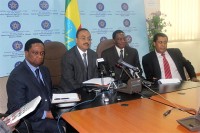Ethiopia: The risk of sending medical teams to ebola-stricken nations
OPINION
 Ethiopia has a long history of showing solidarity with other African countries on strategic issues. Ethiopian peacekeepers were sent to United Nations missions since the 1950s and more recently to crisis spots in Africa such as South Sudan, Somalia, and Rwanda. Ethiopia feels a distinct responsibility for Africa as it is a founding member of the African Union (AU) and its capital Addis Ababa has been the seat of the African Union (formerly the OAU) since its founding in 1963. Successive Ethiopian governments have embarked on Pan African missions despite the economic difficulty in the country indicating how important it is for Ethiopia to take a stand on important Pan African matters.
Ethiopia has a long history of showing solidarity with other African countries on strategic issues. Ethiopian peacekeepers were sent to United Nations missions since the 1950s and more recently to crisis spots in Africa such as South Sudan, Somalia, and Rwanda. Ethiopia feels a distinct responsibility for Africa as it is a founding member of the African Union (AU) and its capital Addis Ababa has been the seat of the African Union (formerly the OAU) since its founding in 1963. Successive Ethiopian governments have embarked on Pan African missions despite the economic difficulty in the country indicating how important it is for Ethiopia to take a stand on important Pan African matters.
Last week, the Ethiopian Ministry of Health announced its decision to momentarily send 210 health workers – doctors, nurses, and public health professionals – to Ebola affected West African countries where over 4,900 people have so far died to help combat the plague and curb the epidemic. In addition, Ethiopia has announced it will also contribute a nominal $500,000 US for the same mission.
However, the decision to send Ethiopian Healthcare Professionals to Ebola stricken West African nations is an entirely different issue that requires careful analysis of the implications. Such decision should not just be made on its goodwill potential for the country or out of a desire to do good but also in terms of its implication for the wellbeing of both the healthcare workers and the general Ethiopian public that these healthcare professionals will return to once the mission is completed.
As highlighted in a recent study by Oxford University, Ethiopia is one of the countries at risk of suffering from the Ebola epidemic by virtue of its geography. Most importantly, any government that is accountable to its people has responsibility for the safety and wellbeing of its citizens first and foremost and decisions must be made taking the public safety into account. For example, the Conservative Government of Australia recently announced that it will not send its medical professionals on harm’s way out of concern both the individual healthcare workers and the Australian general public. Of course, Ethiopia’s relationship with the rest of Africa is different from Australia’s. Australia’s response would have been different if it is one of its neighboring countries that is stricken with the Ebola plague.
While a number of other airlines have suspended flights to West Africa, Ethiopian Airlines4 (EAL) is continuing its routine flights to the region. British Airways, Air France, Emirates, and a few others have halted flights to West Africa over concerns about the deadly Ebola outbreak. EAL has announced that it has taken precautionary measures but whether these measures provide the country the degree of safety it needs is the question. This makes one wonder whether the Ebola risk is properly assessed. That people traveling by plane could contribute to the spread of the virus is a legitimate concern. Ethiopia needs to move swiftly to enhance its domestic preparedness beyond the current level, employ state of the art screening measures, and put plans in place for active post-arrival monitoring of people from Ebola affected areas. A dedicated response team must be created to handle a confirmed patient with Ebola and provide assistance to the hospitals that are handling the known cases. Lessons learned so far from the fight against Ebola by all actors must also be shared with all stakeholders so that they can respond properly if a potential case is discovered.
The author, Dr. Haile Michael Mamo, can be reached at hmamo64@yahoo.com



